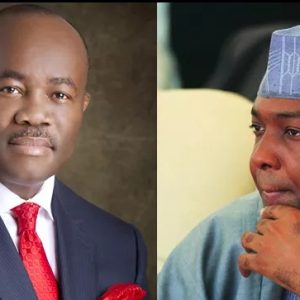The political atmosphere may be thrown into confusion soon, if feelers from the judiciary that it will adhere strictly to the Supreme Court position on defection from one political party to the other while handling cases on the recent gale of defections among politicians are anything to go by.
The Supreme Court had in the case of Atiku Abubakar vs Attorney General of the Federation (2007) 4 SC (part ii) 62 held that it is only a division, factionalisation or fragmentation that can make it impossible or impracticable for a political party to function, that can justify the defection of a legislator from one party to another otherwise the defector automatically loses his seat.
“From the clear and unambiguous pronouncements of the apex court, a division in a political party envisaged by the Constitution cannot be a figment of the imagination of the recent prospective defectors. The division must make it practically impossible for the party to function”, a legal luminary, Mr. Femi Falana argued.
Falana, a Senior Advocate of Nigeria, SAN had explained that defection by legislators, which was a common practice in the first republic, had by this Supreme Court pronouncement been prohibited by the 1999 Constitution.
He further cited the case of Abegunde vs Ondo State House of Assembly (2014) LPELR 23683 whereby the appellant, a member of the House of Representatives defected from the Labour Party to the Action Congress of Nigeria, ACN.
He said, “In justifying his defection, the appellant claimed that the Labour Party in Ondo State was factionalised. Since the division of the Labour Party was limited to Ondo State.”
“The Supreme Court held that the division did not affect the party at the national level to justify the defection. It was therefore decided that the appellant had lost his seat in the House of Representatives.
Prominent among the recent defectors who may be affected by the pronouncement of the Supreme Court are Senate President, Bukola Saraki, Governor Aminu Tambuwal of Sokoto State, Governor Abdulfatai Ahmed of Kwara State, Governor Samuel Ortom of Benue state and former Senate minority leader, Senator Godswill Akpabio alongside some Senators and members of the House of Representatives.
A highly placed judiciary source yesterday told Nigerian pilot that both the ruling All Progressive Congress, APC and the leading opposition party, the People’s Democratic Party, PDP have concluded plans to approach various courts to declare the positions of the affected politicians vacant.
According to the source, with the recent gale of defections, the Nigerian Judiciary will be taking drastic action as well as applying the Nigerian Constitution as it affects defection from one political party to the other.
He said that the decisions that will emanate from various courts of competent jurisdiction will not be in the interest of the various politicians both in the APC and the PDP as well as other political parties.
He further added that the decision of an Abuja High Court sitting in Bwari to entertain the suit filed against Senator Stella Oduah by the People’s Democratic Party, PDP who defected to the All Progressives Grand Alliance, APGA will serve as a pointer to what may befall the affected political office holders.
The source further added that the Chief Justice of Nigeria, CJN; Justice Walter Samuel Onnoghen will personally monitor the cases to ensure that the pronouncement of the Supreme Court and the 1999 Constitution are strictly adhered to.
He said that the courts will determine whether there were crises in all the affected political parties to the extent that warranted the defections or not.
The source also told Nigerian Pilot that all the cases relating to defections will be given an accelerated hearing in other to meet up with the elections datelines.
It would, however, be recalled that even though the Supreme Court pronouncement was made in 2007, there have been defections among governors and legislators without any of them losing their seats.
Prominent among governors who defected from PDP to APC in November 2013 are Rotimi Amaechi (Rivers State), Rabiu Kwankwaso (Kano), Murtala Nyako (Adamawa), Abdulfatah Ahmed (Kwara) and Magatakarda Wamakko (Sokoto)
